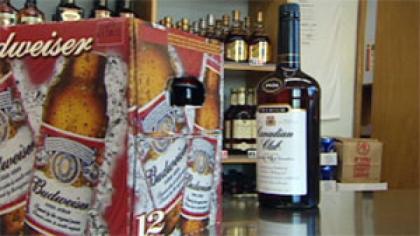 Daily Brew
Daily BrewChildren in bars, return of happy hour on the way as B.C. continues with liquor-law reform

British Columbia's ambitious, and contentious, updating of its liquor laws is proceeding apace.
In the latest development, B.C. Premier Christy Clark announced that happy hour is coming back! And, oh yes, you'll be able to bring your kids to the bar.
Clark announced Tuesday she's supporting several recommendations made last month by parliamentary secretary John Yap in his report on liquor-legislation reform.
Yap made 70 recommendations in all covering everything from retail booze sales to the licensing of drinking establishments as part of the Liberal government's liquor policy review.
Yap's report "makes recommendations on ways to make common-sense, balanced changes to B.C.’s liquor laws that reflect current lifestyles, continue to grow our economy, all while minimizing health and public safety impacts," the government says on the review website.
Clark echoed that view in supporting plans to allow the reintroduction of happy hour, where bars can cut the price of drinks to lure customers.
[ Related: B.C. liquor policy review backs grocery store sales ]
British Columbia apparently is the only province where such discounts have been prohibited. That will change, Clark said, but added they'll be subject to minimum pricing, CBC News reported.
Another change would allow people to go into restaurants and be served drinks without ordering food, as now is required. So, no more having to order that fig-leaf appetizer or plate of chips when you and your friends just want some brews.
Customers will also be allowed to carry their own drinks from place to place, such as from inside the bar to its outdoor patio.
One of the most potentially controversial changes is the plan to allow children to accompany their parents into pubs at certain times of the day.
"Families should be able to dine together in their neighbourhood pub," Clark said.
The government last month announced it would allow liquor sales in supermarkets but not convenience stores, while capping the total number of private liquor outlets.
[ Related: Beer, wine should be sold in grocery stores: Tories ]
Canadian liquor laws still contain the legacy of the country's relatively brief flirtation with prohibition a century ago, where every province except Quebec had anti-booze legislation (Quebec's law lasted less than a year). Most of the laws were repealed in the 1920s, though you couldn't legally get a drink in P.E.I. until 1948.
Alberta privatized liquor sales and distribution 20 years ago, leading to a proliferation of booze outlets, including large stores attached to supermarkets.
Quebec, of course, has long allowed people to buy beer and wine at neighbourhood convenience stores.
Progressive Conservative opposition parties in Ontario and Nova Scotia are pushing to allow grocery and corner stores to do the same but neither government seems interested.
Ontario Premier Kathleen Wynne defended the existing distribution network through government liquor stores and privately-owned Brewers Retail outlets.
"We have a terrific distribution network," Wynne said in October, according to the Toronto Star.
The planned changes in British Columbia, which need legislation to be implemented, have not been universally embraced.
The Alliance of Beverage Licensees, which represents more than 700 private liquor retailers, launched a radio ad campaign against allowing supermarkets to set up booze outlets. It claims the move would give kids potential access to alcohol, even though grocery outlets would be required to set up an enclosed store within a store.
The plan to allow minors to accompany adults into pubs is likely to get some push-back, even though children would only be permitted during lunch and dinner hours.
One of the recommendations Clark is accepting involves expanding the province's Serving It Right program, a mandatory course aimed at educating servers, managers and licensees about their legal responsibilities and on how to deal with over-serving issues.
Expect some negative consequences from the changes, Tim Stockwell, director of the Centre for Addictions Research of B.C., told the Globe and Mail.
"There’s a sense in which everybody is in favour of happy hours, but they don’t, unfortunately, only bring happiness," he said.
Stockwell noted the expansion of Serving It Right and the minimum pricing planned for happy hour shows the government was at least listening to health advocates' concerns. But they've been seen as getting in the way of modernizing the law, he said.
"The net effect will be more consumption, more alcohol-related deaths, injuries, and illness, but there will be more convenience," Stockwell told the Globe.
Others see the changes as no big deal.
"Reading the list of recommendations, they're just things that are normal in normal cities around the world," filmmaker Melissa James, who produced the 2010 documentary No Fun City about Vancouver's civic wet-blanket mentality, told QMI Agency.
"It's not something to be that excited about. It's like, ‘We're almost on par with cities in other countries.'
"Like they said - it's common sense," James said. "If you treat people like adults, hopefully they'll act like adults."


